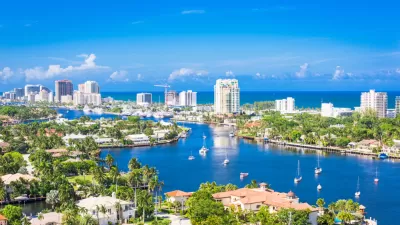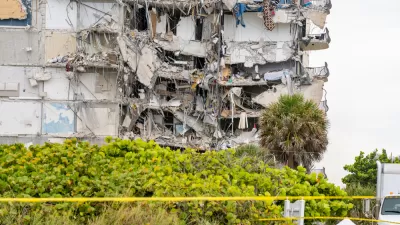Miami Beach is drafting its own textbook for how to respond to sea level rise. The New Yorker provides in-depth coverage of a region under siege by the sea that surrounds it.
Elizabeth Kolbert surveys the scene in Miami Beach—where a collection of scientists and politicians agree—sea level rise is going to very very, very challenging for the city.
First interviewed is Hal Wanless, chairman of the University of Miami Department Geological Sciences, whose studies have him led to conclude "that much of the region may have less than half a century more to go."
Organizations as varied as the Intergovernmental Panel on Climate Change, the United States Army Corps of Engineers, and the National Oceanic and Atmospheric Administration differ on how much seas should be expected to rise. According to Wanless, all those organizations are probably being too optimistic.
Meanwhile, ice shelves in Greenland are melting quickly, opening new "floodgates." According to Kolbert, "Greenland’s ice holds enough water to raise global sea levels by twenty feet."
Miami Beach's response to the pending threat has had implications in the political sphere. Miami Beach Mayor Philip Levine was elected in 2013, according to Kolbert "after airing a commercial that tapped into voters’ frustration with the continual flooding. It showed him preparing to paddle home from work in a kayak."
Kolbert immediately increased stormwater fees to fund the installation of "enormous underground pumps that will suck water off the streets and dump it into Biscayne Bay." So far the city has completed six pumps, with 44 more planned.
The long read article includes a lot of narratives and dispatches from specific locations. Kolbert also draws connections to the larger region of South Florida, to the politics of the state's Republican leadership, like Governor Rick Scott and Senator Marco Rubio, who have both proven staunch in opposing denying regulatory or other policy responses to climate change, and to the large-scale interventions that will be necessary for the region to remain habitable in the future.
FULL STORY: The Siege of Miami

Alabama: Trump Terminates Settlements for Black Communities Harmed By Raw Sewage
Trump deemed the landmark civil rights agreement “illegal DEI and environmental justice policy.”

Study: Maui’s Plan to Convert Vacation Rentals to Long-Term Housing Could Cause Nearly $1 Billion Economic Loss
The plan would reduce visitor accommodation by 25% resulting in 1,900 jobs lost.

Planetizen Federal Action Tracker
A weekly monitor of how Trump’s orders and actions are impacting planners and planning in America.

Wind Energy on the Rise Despite Federal Policy Reversal
The Trump administration is revoking federal support for renewable energy, but demand for new projects continues unabated.

Passengers Flock to Caltrain After Electrification
The new electric trains are running faster and more reliably, leading to strong ridership growth on the Bay Area rail system.

Texas Churches Rally Behind ‘Yes in God’s Back Yard’ Legislation
Religious leaders want the state to reduce zoning regulations to streamline leasing church-owned land to housing developers.
Urban Design for Planners 1: Software Tools
This six-course series explores essential urban design concepts using open source software and equips planners with the tools they need to participate fully in the urban design process.
Planning for Universal Design
Learn the tools for implementing Universal Design in planning regulations.
Caltrans
Smith Gee Studio
Institute for Housing and Urban Development Studies (IHS)
City of Grandview
Harvard GSD Executive Education
Toledo-Lucas County Plan Commissions
Salt Lake City
NYU Wagner Graduate School of Public Service





























